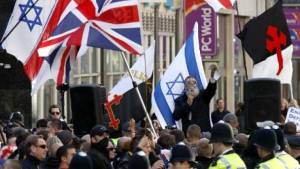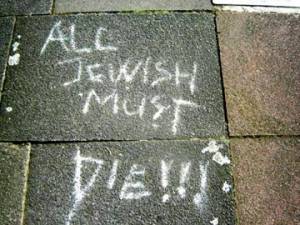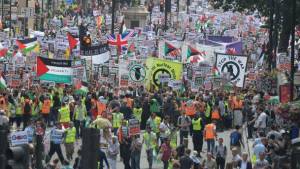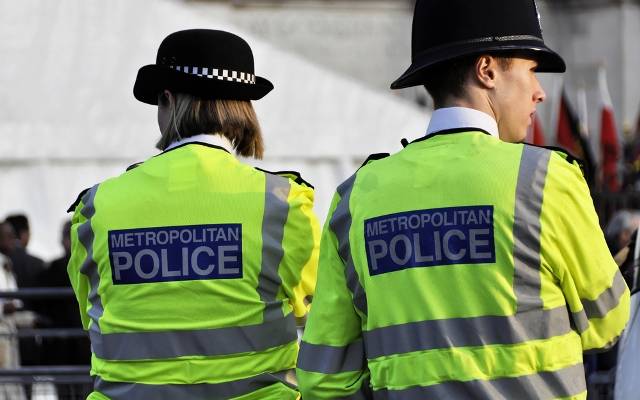
English Defence League rally in 2010 against Islamization in the UK and rising anti-Semitism. (AP)
Acts of anti-Semitism in the UK remain very high despite a slight drop in the Jewish community’s recording of such incidents in 2015.
A report on anti-Semitic incidents recorded in 2015 in the United Kingdom reveals that despite government efforts to combat the phenomenon, the volume of incidents remains alarmingly high.
The Community Security Trust (CST) of British Jewry recorded 924 anti-Semitic incidents in 2015, the third-highest annual total ever recorded.
In its report, the CST found that the number of incidents was 22 per cent lower than in 2014, which marked the highest annual total ever recorded. The second-highest annual total recorded was in 2009, with 931 anti-Semitic attacks.
Significant events in those two years, including Israeli counter-terror operations in Gaza, could explain the spike in anti-Semitics events. In contrast, there had been no such trigger event in 2015 and no identifiable temporary spike in incidents to explain the relatively high annual total, the CST said in its latest report presented this week.
Previous years in which there was no significant trigger event include 2013, when 535 anti-Semitic incidents were recorded by CST; 2011, when 609 incidents were recorded; and 2008, when 546 incidents were recorded. The 2015 total of 924 anti-Semitic incidents is “notably higher” than the totals for those years.

Anti-Semitic graffiti on a north London street. (AP/CST)
The highest monthly totals of 2015 were recorded in January and February, two months during which Jewish communities in France and Denmark were attacked by Muslim terrorists.
In addition to the 924 anti-Semitic incidents recorded in 2015, a further 686 reports of potential incidents were received by CST but not included in the total, as there was no evidence of anti-Semitic motivation, targeting or content.
Around three-quarters of the anti-Semitic incidents took place in Greater London and Greater Manchester, the cities with the two largest Jewish communities in the UK.
The Jewish community watchdog said it was likely that there was significant under-reporting of anti-Semitic incidents to both the CST and to police, and that the number of anti-Semitic incidents that took place is significantly higher than the number recorded in this report.
There were 86 violent anti-Semitic assaults reported to CST in 2015, an increase of six per cent from the 81 anti-Semitic assaults recorded in 2014 and the highest number since 2011, when CST recorded 95 violent attacks.
This is the only category of incidents that increased in 2015 compared to 2014. The 86 violent anti-Semitic incidents included four incidents categorized as extreme violence, meaning incidents that involved grievous bodily harm or a threat to life. CST recorded one incident of extreme violence in 2014 and none in 2013.
Incidents of damage and desecration to Jewish property fell by 20 per cent from 81 in 2014 to 65 in 2015. There were 49 incidents in this category in 2013 and 53 in 2012.

Thousands of anti-Israel activists march through central London in July 2014. (AP)
The most common single type of anti-Semitic incident in 2015 involved verbal abuse directed at random Jewish people in public; such acts are more commonly associated with anti-social behavior or local patterns of street crime than with political activism or ideology. In 354 incidents, the victims were Jews who were attacked or abused while going about their daily business in public places. In at least 161 of these incidents, the victims were visibly Jewish, usually due to their religious or traditional clothing, school uniform or jewelery bearing Jewish symbols.
A total of 458 anti-Semitic incidents out of the total of 924 in 2015 involved verbal anti-Semitic abuse.
There were 76 incidents in 2015 reported to CST in the category of threats, and 12 recorded in the category of literature, which comprises mass-produced anti-Semitic mailings and emails.
“[This] is a reminder that the amount of anti-Semitic abuse in this country remains unacceptably high,” said CST chief executive David Delew, writing in the UK’s Jewish News.
Home Secretary Theresa May added: “While a fall in anti-Semitic incidents should be welcomed, there are still too many cases of this type of hate crime. We know that these types of crimes are often underreported. We must give victims the confidence to come forward to report these terrible acts.”
By: United with Israel Staff
